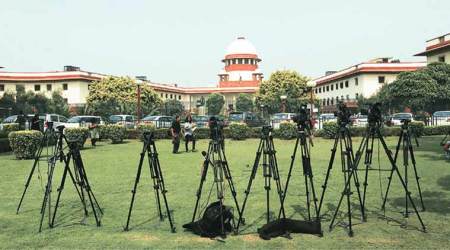 India’s oldest Parliamentarian Rishang Keishing, who was a member of the First Lok Sabha in 1952, dies aged 97. (Express Photo: Renuka Puri)
India’s oldest Parliamentarian Rishang Keishing, who was a member of the First Lok Sabha in 1952, dies aged 97. (Express Photo: Renuka Puri)
Rishang Keishing, the grand old man of Manipur, who had also served as an MLA for seven terms, apart from having become chief minister of the state four times, passed away at the Regional Institute of Medical Sciences (RIMS), Imphal, on Tuesday evening. He was 97. He was a member of the first Lok Sabha in 1952. When he retired from public life in 2014, he had just completed his term as member of the Rajya Sabha.
Born to Rungdi Keishing and Mungshing Keishing of Bungpa Khunou village in the present-day Ukhrul district of Manipur on October 25, 1920, Rishang had begun his career as a primary school teacher in his native village when he was just 16. But, after quitting that job, he attended as many as three high schools – at Imphal, Kohima and finally at Jorhat, from where he passed his Matriculation in 1945. As a college student in Kolkata, he not only saw India become independent (Manipur was then a princely state), but also came into contact with Birendra Kumar Bhattacharyya – a Socialist activist who later became a well-known author and won the Jnanpith – whom he took to Ukhrul to teach science in the Ukhrul Christian Junior High School to teach science. Rishang himself became headmaster after upgrading it to a high school, but had to quit that job to contest and get elected to the first Lok Sabha in 1952 as a candidate of the Socialist Party.
Since then, there was no looking back for Rishang Keishing, a man who had not only witnessed the journey of India through seven long decades since Independence, but also became an active player – though on the government side – in Naga politics that had turned increasingly violent through as years passed. He continued to win the next two Lok Sabha elections from Manipur Outer constituency in 1957 and 1962 as a Socialist Party candidate, until in 1964, he joined the Congress party at the invitation of Jawaharlal Nehru.
After Manipur became a full-fledged state in 1972, Keishing returned to state politics, and got elected to the state assembly from Phungyar, an assembly segment which he represented for seven terms till 2002. While he first became a minister in 1975, he was sworn in as chief minister of Manipur for the first time on November 27, 1980, an office which he occupied as many as four times between 1980 and 1997. While his first stint as chief minister lasted only 92 days, his longest innings was for six years and 258 days (1981 to 1988) during which he also steered the Congress party successfully through an assembly election.
In 2002, Keishing was elected to Rajya Sabha from the lone Manipur seat, and was re-elected in 2008, and as he walked out of Parliament House in February 2014, he not only became the oldest member of the House, but also became the only MP from the first Lok Sabha to have remained in Parliament till such a ripe age of 94. His term as Rajya Sabha member in fact came to an end on April 9, 2014. “I have had enough. I’m glad to go,” Keishing had told The Indian Express as he walked out of Parliament on February 20, 2014, but not before ruing that the standard of debates and discussions in Parliament had deteriorated in front of his eyes. “I am sad that Parliament now is not what it used to be. It’s only shouting and shouting. MPs now are like trade union leaders, they come here only to demand this and demand that. This is not the Parliament I knew,” he had said.
Living hero: Rishang Keishing, whose native district Ukhrul had also sent up Thiungaleng Muivah, the general secretary of NSCN(IM), had not only seen the rise of the Naga separatist movement from close quarters, but had also remained the hero of ‘Yaruingam’ – one of the most celebrated Assamese novels. Written by Birendra Kumar Bhattacharyya, his closest friend of college days in Kolkata who later also went to teach Science in his village high school, ‘Yaruingam’ is the story of the rise of the Naga movement in the Naga-inhabited hills of Manipur told through the life of none other than Rishang Keishing.
Keishing in fact appears in the novel in his real name, and so also his wife Khatingla, with the story woven around two youth from the same place – a former INA soldier Vidashali secretly forming an army to fight for a sovereign Naga state, and Rishang, an educated youth influenced by the ideas of love, peace, tolerance and education as preached by the Christian missionaries and Mahatma Gandhi.

